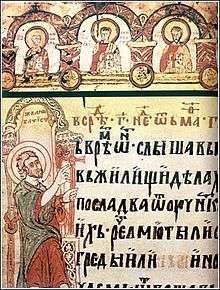Branislav Crnčević
Branislav "Brana" Crnčević (Serbian Cyrillic: Бранислав Брана Црнчевић, Serbian pronunciation: [brǎnislaʋ brâːna tsř̩ntʃeʋitɕ]; 8 February 1933 – 14 April 2011) was a Serbian writer and politician.[1]
Branislav Crnčević | |
|---|---|
Branislav Crnčević (left) | |
| Born | 8 February 1933 Kovačica, Kingdom of Yugoslavia |
| Died | 14 April 2011 (aged 78) Belgrade, Serbia |
| Resting place | Belgrade New Cemetery |
| Occupation | Writer, politician |
| Nationality | Serbian |
| Alma mater | University of Belgrade Faculty of Philosophy |
| Period | 1963–2011 |
| Children | Vida, Ivan and Mina |
Throughout his decades-long career, he wrote novels, aphorisms, short stories, TV dramas, poems and children's literature.
Biography
Crnčević was born on 8 February 1933 in Kovačica and was raised in Ruma. After the death of his father, he spent his childhood in orphanages and foster homes.
He graduated from the University of Belgrade Faculty of Philosophy. He began his career as an employee of the Zrenjanin brewery regional office in Novi Sad. He then worked as a journalist and editor in the newspapers Jež and Duga along with the newspaper for children called Mali jež. He also published columns in various newspapers and magazines such as NIN and Politika. In the meantime, he published his first children's book Bosonogi i nebo and later his first collection of aphorisms Piši kao što ćutiš. He entered into the literary scene under the pseudonyms Vinon Rumski and Branislav BIP.
He was one of the screenwriters for the 1987 film The Harms Case.
Death and legacy
Crnčević died on 14 April 2011 after a long illness.[2] He is interred in the Alley of Distinguished Citizens in the Belgrade New Cemetery in a joint plot with Milutin Čolić, Mladen Srbinović and Momo Kapor.[3]
The cultural center in Ruma is named after him. In September 2016, a street in the Vračar municipality of the city of Belgrade was named after him.[4]
Works
- 1963. Bosonogi i nebo
- 1963. Cipelice od krokodilske kože
- 1963. Njen prvi čaj
- 1965. Devojka sa tri oca
- 1965. Kafanica, sudnica, ludnica (izvođeno i kao predstava u Ateljeu 212)
- 1965. Piši kao što ćutiš
- 1968. Dunavo
- 1967 – 1971 Zanati
- 1971. Kapetan i lula
- 1971, 1981, 1989, 2006. Dnevnik jednog...
- 1978. Peta strana sveta
- 1982. Sibiri
- 1982. Emigrant i igra
- 1984. Mrav dobra srca
- 1985. Snovi bez tumačenja
- 1990, 2006. Srpska posla
- 1992, 2006. Srpska i hrvatska posla
- 1994. Glasnik
- 1997. Crni đavo, crveni rep I-II 2001. III
- 2001. Pesme
- 2003. Zaštitnica umetnosti i druge pripovetke
- 2005. Zemlja nadimaka
- 2006. Knjiga zadušnica
- 2006. Obećani svet
- 2007. Sedam mokrih majica i drugi zapisi
- 2008. Ima da nas nema
- 2009. Čuvari pepela
- 2010. Šta ima
- 2010. Piši kao što ćutiš (izmenjeno, dopunjeno i prošireno izdanje)
- 2011. Crni đavo, crveni rep I-II
- 2011. Zaštitnica umetnosti i druge pripovetke
- 2012. Trosobna samica / Trёhkomnatnaя odinočka, drama
| Wikimedia Commons has media related to Branislav Crnčević. |
References
- Glas javnosti (24 October 2000). "Ko je ovaj čovek". Retrieved 22 August 2019.
- "Preminuo Brana Crnčević". Blic.rs. 14 April 2011. Retrieved 23 April 2013.
- International graves
- Večernje novosti (8 September 2016). "Brana Crnčević dobio ulicu na Vračaru". Retrieved 15 October 2019.
